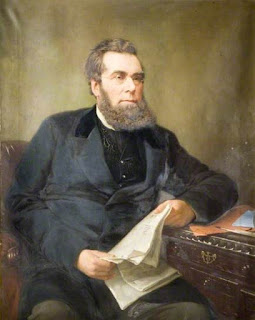Constituency : Stoke-on-Trent 1880-85, Birmingham Bordesley 1885-6, Nottingham West 1886-92, Leicester 1894-1906
Henry was the other victor at Stoke and sat as a Lib-Lab MP.
Henry was the son of a stonemason and followed in his father's footsteps, working on the clock tower of the Palace of Westminster in the 1860s. He was involved in the Reform League in the 1860s, In 1872 he was elected to chair a Mason's Committee during an industrial dispute. He was a success and began working for the Stonemasons Union full time. He was their delegate to the Trades Union Congress.In 1873 he became secretary of the Labour Representation League. Unlike Burt and McDonald, Henry was unsuccessful in 1874 being defeated at High Wycombe. In 1875 he became Secretary of the T.U.C.'s parliamentary committee. He told the TUC that year that the labour movement should look to keep women at home. He was a staunch Methodist. He agitated for the right to peaceful picketing which was secured by the Conspiracy and Protection of Property Act of 1875.
Henry described the Lib-Lab arrangement as "a system by which you cordially co-operate with your friends , while reserving to yourself, should the need arise, your own independence of action".
Once in Parliament Henry worked for workmens' compensation , allowing working men to become magistrates and the inclusion of "fair wage" clauses in government contracts. In 1884 he sat on the Royal Commission for working class housing. He refused to appear at Court functions until he had saved up enough money to buy court dress.
Henry was a leading advocate of leasehold reform and in 1886 introduced a bill empowering all leaseholders to purchase the freehold title to their land subject to charges and conditions.
In 1886 Henry became Under Secretary of State for the Home Department, the first working class person to hold government office. He had to resign his post at the TUC. Gladstone had earmarked him for a post at the Board of Trade but Mundella objected that his background would make him unacceptable to manufacturers. He remained loyal to Gladstone over Home Rule so had to leave Birmingham and challenge in Nottingham West where he evicted Charles Seely in a tight contest.
Now he was an opposition MP Henry resumed his post with the TUC but came under fire from left wingers such as Keir Hardie for not doing enough for the cause. When Henry opposed the eight hour day Hardie accused him of being more Liberal than Labour . In 1889 Hardie accused him of holding shares in a company which treated its workers badly.
Beatrice Webb met him in 1889 and described him as "A commonplace person, hard working no doubt , but a middle class philistine to the backbone, appealing to the practical shrewdness and the high flown but mediocre sentiments of the comfortably off working man.
.In 1890 Henry was defeated by Hardie on the eight hour day question and resigned citing health reasons. In 1892 he sat on the Royal Commission for the impoverished elderly but lost his seat to Seely at the election that year. The loss of local workers support over the eight hour day question was thought to have cost him.
Henry was unsuccessful at the Grimsby by-election in 1893 but returned at one for Leicester in 1894 where the local working class Liberals had been dissatisfied with their previous representatives.
Henry retired to Norfolk after leaving Parliament and became an alderman. He died in 1911 aged 71.




















